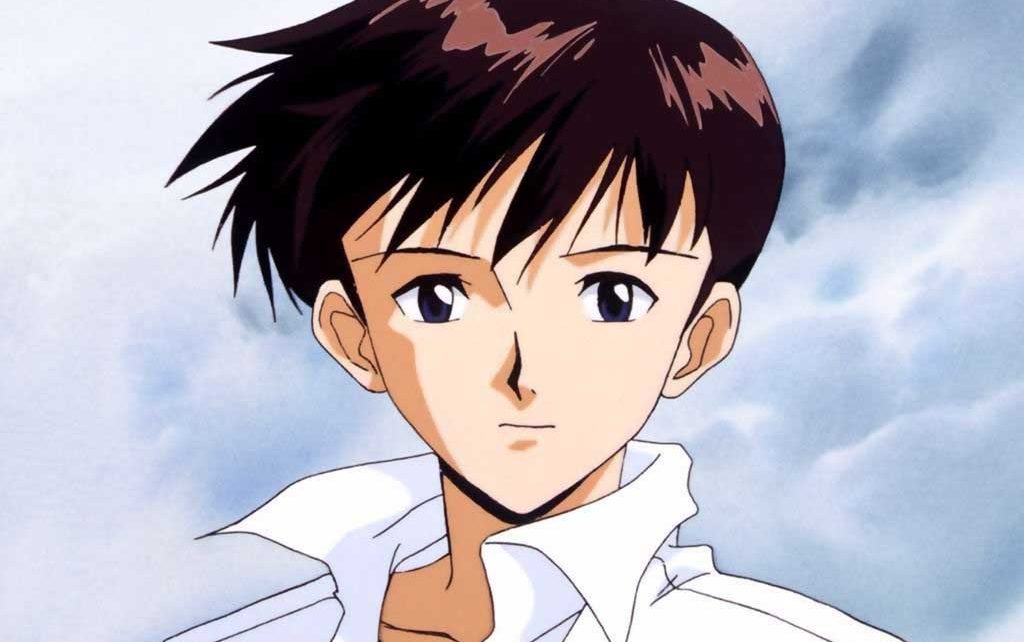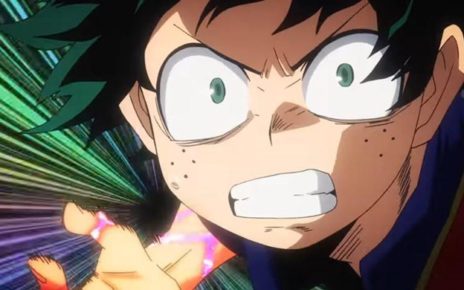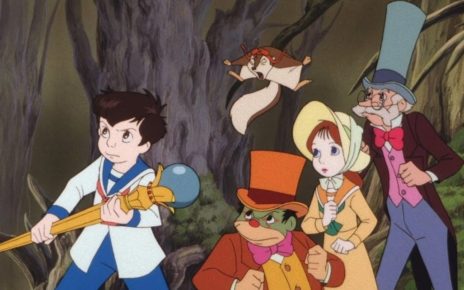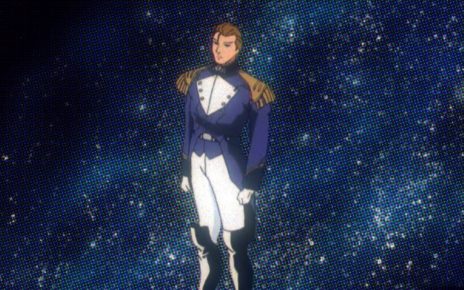Neon Genesis Evangelion is a show that was born as a paint-by-numbers giant robot anime made to check some basic genre boxes and instead evolved into an exploration of the deepest parts of the human condition. The audience surrogate and one of the most depressing loners in entertainment, Shinji Ikari, is our guide through its stares into the abyss of human interaction, where he endures through awful experiences trying to connect to others only to have all of that thrown in his face by the end of Evangelion’s one season run. It is this look into relationships of all sorts that — despite giant robots, secret doomsday organizations, and deep religious symbolism — sits at the true heart of the story. And it makes Neon Genesis Evangelion even more relevant today than it was in its original mid-’90s release.
One of the first signs we get on NGE’s look into relationships is the discussion of the Hedgehog’s Dilemma. (Episode 6 of the show is even named after it.) It’s the psychological concept of staying self-insulated from relationships based on the assumption that any form of emotional intimacy will result in emotional strain. As the scientist Ritsuko explains it in the series, “Even though a hedgehog may want to become close with another hedgehog. The closer they get the more they injure each other with their spines. It’s the same with some humans. The reason [some people] seems so withdrawn is because [they’re] afraid of being hurt.” Shinji’s journey starts with this very problem. He lacks any sort of friends, has an incredibly strained relationship with his father Gendo, and has been traumatized from losing his mother at an early age. Shinji chooses to keep himself isolated while living with a government agent, Misato, by listening to a Walkman on repeat. He only engages with others when someone else, like classmates Toji and Kensuke, makes the first move. Considering Shinji’s first interaction with them is Toji beating the crap out of him for indirectly injuring Toji’s sister during his first time piloting a giant EVA robot, you almost can’t blame him. Throughout the whole show’s run, every relationship ends up causing him some sort of pain, from simple disappointment to being forced to kill the one person that gave him the closest bond emotionally. But then again, isn’t that the entire human experience?
This whole idea of self-insulation seems to be the zeitgeist of most folks in their twenties these days, where online dating can feel ephemeral and memes about depression and loneliness are not only a prime a way to vent online, but a prime source of humor. With all the eyes social media can put on every thought where each negative comment can seem of greater number the positive ones, it’s no wonder we’ve seen reports of children’s anxiety levels on the rise. It seems the only way to avoid pain is to avoid any expression at all and just try to cope with the sadness of everyday life without showing signs of this sadness. Anything thrown into the mix to change the status quo and changes like that are always frightening, even if it is for the best.
When episode 16 rolls around, we see Shinji talk directly with the enemy, where the Angel Leliel engulfs Shinji along with EVA-01. This Angel communicates with Shinji telepathically in one of the most beautifully abstract pieces of animation ever committed to the medium. In a discussion of existence and being that would make Descartes beam with pride, Leliel tells Shinji about how there are multiple versions of you within your own reality, such as the version of Shinji that Shinji’s mind interprets, the version of Shinji that Rei interprets, the version of Shinji that Misato interprets, etc. As Leliel says, “all are different Shinji Ikaris, but each of them is a true Shinji Ikari. What you fear is the Shinji Ikaris who exist in the minds of others.”
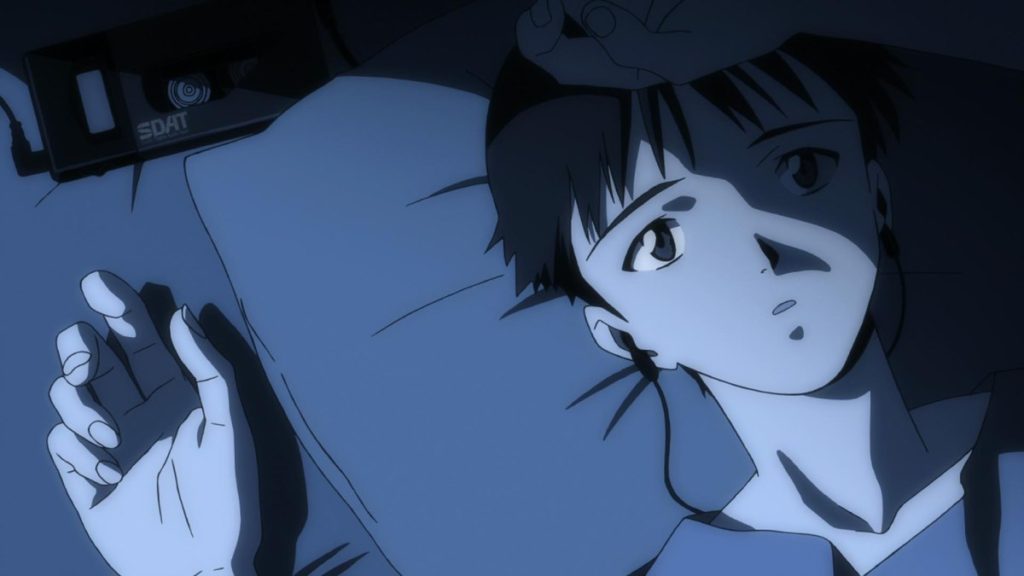
The point is that nobody can ever know the truest sense of Shinji aside from Shinji, but all versions of Shinji are perfectly valid interpretations. But when the Angel questions Shinji latching onto the few nice words his father has told him in this series, Leliel asks why any human would truly care for small happy moments throughout so much pain. But Shinji retorts that the happy moments, even if they’re few and far between, are necessary for humans to live, even if we have to deceive ourselves. As Shinji says, “if I trust their words, it’s enough. It’s enough to survive.”
Given the way that social media has consistently given every human on planet Earth the ability to create a funhouse mirror version of a life full of highlights and passive aggressive pain, this couldn’t be more relevant than when the episode originally aired in January 1996. There are more interpretations of every person on this planet than ever before, and there’s never been such pinpoint control on how some of these versions can be presented into the world. At the same time, this means there are even more versions to keep tabs on. From your dating profile to your Facebook account to your gamertag, it’s all versions of you that act as lenses to how the world perceives you. But in all that noise, it’s the positive responses that always break though to push us on. Even if it’s a stranger saying that you had a good play in Fortnite or you getting an accidental match on Tinder, these positive moments help fight the monotony of a life devoid of human interaction.
“I hate myself. But, maybe, maybe I could love myself.”
In the final (infamous) two episodes, the secretive, antagonistic organization SEELE completes its purpose of Humanity Instrumentality — a process where all of humanity’s soul essentially form into a singular form to force humanity into a higher evolutionary status. None of this is shown on screen (instead told through title cards), but we are shown the metaphorical process of multiple characters essentially having a group AA meeting where their greatest character flaws are put on display. With all of these characters going through the greatest attacks on their identity, Shinji in the end is given the choice to decide whether he truly wants to maintain humanity’s existence in this new state or destroy it all simply because of his issues with intimacy. Simply put, humanity cannot exist without others and Gendo’s Instrumentality Project acts as a way to force all of humanity to fill and complement each other. As Gendo says, this was initiated, “because there is no other way to exist.” With that in mind, Shinji, who has consistently taken issue with this very concept throughout his character arc, is forced to give the deepest perspective on why he is the way he is. He is made to realize the reason for his unhappiness is from a lack of self-love and self-understanding and without that, he will consistently fail to properly connect with others. After going through even more trippy animation and discussions with various perceptions of how he thinks his friends and family truly think, Shinji comes to the realization that life with other people is necessary not only for the sake of humanity, but for the sake of himself as well. The words of others make him realize that his negative self-perception may not only be unnecessary, but flatout wrong. With this, he says, “I hate myself. But, maybe, maybe I could love myself. Maybe, my life can have a greater value. That’s right! I am no more or less than myself. I am me! I want to be myself! I want to continue existing in this world! My life is worth living here!”
At the end of the day, Shinji’s realization is the rallying cry we all need, regardless of age, sex, gender, orientation, etc. In a world that manages to both bring us closer from a superficial level but more isolated on a personal level, it’s the proof that relationships are hard to create, but essential to survival. We all need people to open us up to the reality that we have the possibility to love ourselves. There is a lifetime of pain and suffering we will all have to endure on a mental level from terrible experiences with others, but it is a pain that is necessary to endure rather than just live a life of solitude and cosmetic interactions. As painful as life may be, divorcing yourself from all seven billion people on this planet is a coping mechanism that is only going to lead to more problems and zero solutions. Instead, face-to-face interactivity and empathy is not only the way to life, but the way to thrive.
Ultimately that’s the message of Neon Genesis Evangelion, and why after all that emotional labor, the television series ended with one word.
“Congratulations!”
Thanks for reading The Dot and Line, where we talk about animation of all kinds. Don’t forget to follow us on Twitter and sign up for our newsletter.


